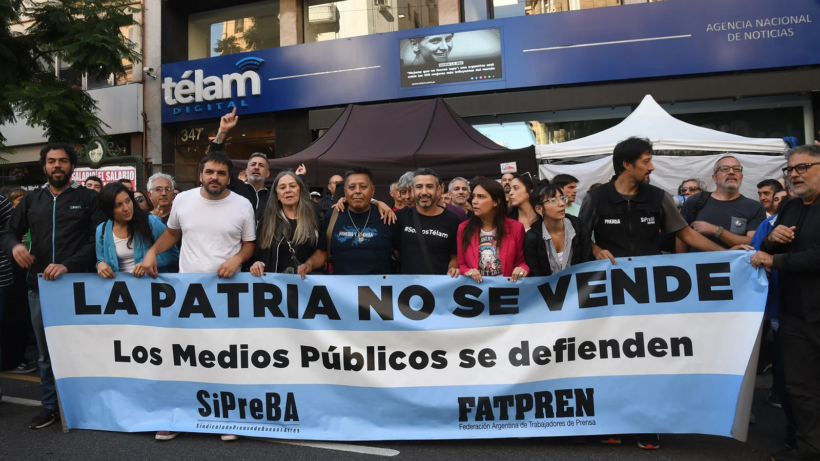A systematic attack against freedom of the press and the right to information through various measures and actions, including direct police repression of journalists and reporters, is a sign of the current national government.
Since the beginning of his administration, President Javier Milei has made clear his hostility to the press and journalistic work, in the framework of a brutal adjustment of public accounts. Against this backdrop, the media companies are seeking to deepen the precariousness and the advance on the rights won by press workers.
Trade union organization and struggle are the only tools that can put a limit to prevent the destruction of the craft and the right to information, warn the unions in the sector.
As soon as Milei took office, the rejection of journalism and its workers by the new President was evident. As the Federation of Press Workers (Fatpren) detailed in a recent statement, in parallel to the “chainsaw and blender” that the Head of State implemented in general, a systematic attack on press freedom and the right to information is being carried out through various measures and actions. This includes direct police repression of journalists and reporters during mobilizations and social protests in the streets.
In this context, taking advantage of the government’s illegal intervention and advances on the public media, the media companies sought to deepen their policy of making the craft more precarious by claiming the impact on their income of the suspension of the official budget. Thus, throughout the length and breadth of the country, a profoundly complex situation can be observed in the private media sector.
Photo @SomosTelam
The workers of Diario Popular went on strike for 48 hours on 15 and 16 April because the company owed them two months’ wages, half a month’s salary, and social charges. At Página 12, the company refuses to pay the agreed wage increase.
The newspaper El Libertador de Corrientes intends to move forward with a crisis procedure to lay off workers. Similar is the situation at El Tribuno in Salta province. In both cases, Fatpren and the local unions have opposed these maneuvers in defense of jobs.
In San Juan, at Diario de Cuyo there have also been dismissals, in an attempt to intimidate the emergence of the Press and Communication Workers’ Association of the province. At this historic newspaper in the province of Cuyo, the workers have been complaining about recurrent delays in the payment of salaries and appalling health and safety conditions in the establishment.
Meanwhile, the press workers of Córdoba in the Círculo de la Prensa (Cispren) denounced unfair practices on the part of the provincial employers’ chamber in the context of the stalled bargaining negotiations. The situation of the public media in the provinces is also in danger, as denounced by the Radio and Television Service (SRT) of Córdoba.
In general terms, media companies have long been aiming for a model of poverty wages and precarious workers, regardless of the right to information for citizens. In this way, the multiplication of fake news and hate speech on the digital platforms that the President celebrates so much was favored.
The general situation we have in the private media is one of poverty wages, which we have been fighting against, which is why we have the phenomenon of moonlighting, which makes the daily work of the press much more complex”.
Carla Gaudensi, General Secretary of Fatpren
“The general situation we have in the privately-owned media is one of poverty wages, which we have been fighting against, which is why we have the phenomenon of moonlighting, which makes the daily work of the press much more complex,” warned Carla Gaudensi, Fatpren’s general secretary.
In this sense, the attempt to destroy the craft finds a limit in the reconstruction of the union at the national level. Fatpren says that strengthening grassroots union organizations in all districts is the only possible way to fight for a wage increase and better working conditions.
Of course, it is a profoundly unequal struggle that, in addition, has the national government openly fighting for the attack on labor rights. For this reason, the federation has been actively participating in the plan of struggle promoted by the CGT together with the rest of the labor movement against this model of “planned misery”.
Source: somostelam.com.ar






